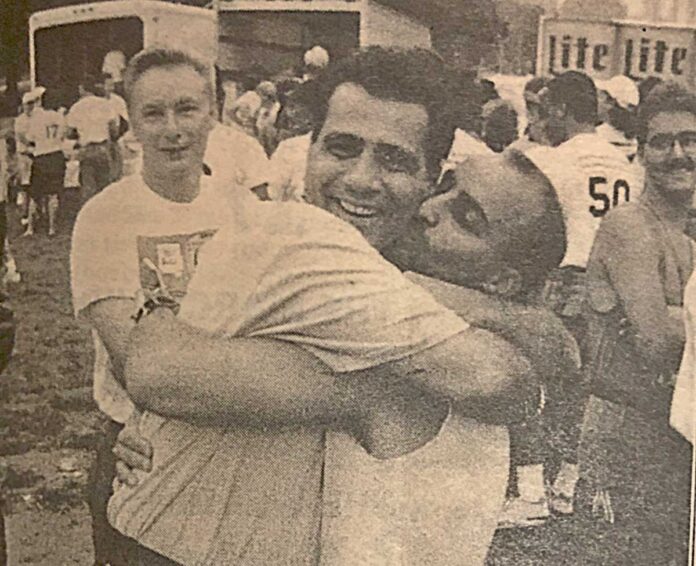
In August 1993, the city of Philadelphia welcomed 1,700 visitors and 75 teams from across North America for the Gay Softball World Series. Mayor Ed Rendell kicked off the event in front of the Art Museum steps with performances from the Mummers’ Hegerman String Band and the Anna Crusis Women’s Choir. Led by a mustachioed man wearing a silver-sequined robe and white feather halo, Hegerman performed the tune “Happy Days Are Here Again,” and strolled right into the crowd when there was no more room left to march. Visitors not familiar with the Mummers were shocked to learn the makeup of the group.
“They’re straight? Really?” one man from Boston remarked.
All of the games were played in Fairmount Park’s Dairy and Edgely Fields, which were refurbished along with an additional field being added for the event (totaling $50,000). To help raise funds, Miller Lite beer and several local companies were signed on as sponsors, and the Philadelphia Convention and Vistor’s Bureau provided logistical guidance to organizers. Many attendees stayed at the Center City Hilton, where buses ran every 20 minutes to Fairmount Park.
The City of Brotherly Love Softball League (CBLSL), fresh off its ten-year anniversary, had five teams compete: the Bike Stop, the Venture Inn, Key West, the Leather Rose, and Uncle’s. Other teams who competed included the Outlaws (Norfolk), WCAA Wrecks (Chicago), Puff Decorum (Seattle), Accelerated Chiropractic Nads (Atlanta), the Golden Bears (San Francisco), and Spike Black Sox (New York). In addition, a team from Boston comprised primarily of foster kids raised by Boston’s Tom Reeves (who founded Gay Community News) also competed.
Winners of the four divisions were the Cafe Team (San Francisco), the Outlaws, Elite II (Seattle), and the Golden Bears.
“Philadelphia put on a World Series that was as enjoyable, competently organized and run, well-received, and as exciting as any in recent memory,” PGN sports writer Jim Madden wrote. “That feeling of pride filled me whenever I saw the magnificent conditions of the playing fields, or how much fun all the participants were having.”
A notable issue that arose from the event had to do with player guidelines, but not in the way one might have expected. Richard Buckley, a longtime member of the Bike Stop’s team, was banned from playing in the world series because of his sexual orientation: heterosexual. The North American Gay Amateur Athletic Association, which organized the Gay World Series, had a ban on straight participants at the time. The ban did not apply to local organizations such as CBLSL.
“I’ve been there for a number of years and I thought I sort of deserved to play” Buckley told PGN at the time. He also said that his teammates were more upset about the rule than he was.
When Philadelphia learned that it would host the 1993 Gay World Series, Bob Connolly, Commisssioner of CBLSL, tried to get the rule changed — especially since the city’s Fair Practices Act banned discrimination based on sexual orientation. Connolly said there were around 10 straight players in CBLSL who were not able to play. The rule was ultimately changed to allow up to two straight players on a team’s roster, but it did not go into effect until 1994.
At the time, some believed that the new rule allowing straight participants in the Gay World Series was a bad idea.
“A lot of gay people were told they were not good enough to play,” Rick Ritt of San Francisco told PGN in 1993. “They were told to take secondary roles — cheerleading, selling food.”
Ritt said that the new rules would be a bureaucratic nightmare and lead to potential legal problems.
“From a legal point of view, this puts us in a more vulnerable place because if you have three straight players on a team, who do you pick? Now we’re subject to equal access laws.”
However, Ritt ultimately said the issue boiled down to one simple idea: inclusion.
“For every straight person on the roster in the world series, there’s a gay person staying home. It’s a chance to do something in an openly gay environment and not be ridiculed.”
